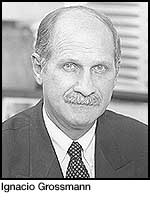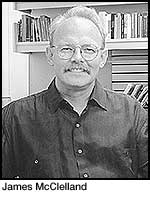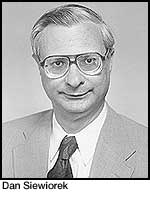|
|
||
|
|
|
Grossmann, McClelland and Siewiorek Earn Top Academic Distinction
Ignacio Grossmann, James McClelland and Dan Siewiorek have been named university professors, the highest academic distinction faculty members can achieve at Carnegie Mellon.
The title is awarded on the basis of national and/or international recognition for research, artistic and literary accomplishments, and other scholarly activities.
"This year's 'class' of newly appointed university professors represents a group of truly distinguished researchers and educators," said Provost Mark Kamlet. "Their research has, in each case, had an extraordinary impact on their fields and on the university. We are very proud to have them as colleagues at Carnegie Mellon."
Ignacio Grossmann
His work in developing the theoretical framework and tools for computer-aided design in the chemical process industry has had a significant impact in academe and industry.
"Professor Grossmann has had a brilliant career as a researcher and educator, and has exercised exemplary leadership in his profession," said university professors Egon Balas, Angel Jordan and Arthur Westerberg in their nominating letter.
"Ignacio Grossmann is an outstanding scholar, educator and leader," said College of Engineering Dean John Anderson. "His research has had profound influence on process engineering, and his former Ph.D. students occupy important positions in academia and industry.
"In addition, he has effectively led the Chemical Engineering Department at Carnegie Mellon to national recognition in his seven years as department head," Anderson added. "The many awards that Ignacio has won and his election to the National Academy of Engineering attest to his international status as one of the top engineers in the country."
Grossmann began his career at Carnegie Mellon in 1979 as assistant professor of chemical engineering. He was promoted to associate professor in 1983 and director of the Synthesis Laboratory at the university's Engineering Design Research Center (EDRC)-now the Institute for Complex Engineered Systems-in 1988. Grossmann was appointed a full professor in 1986 and department head in 1994.
Published in more than 200 professional publications, Grossmann has received numerous awards, including the William H. Walker Award for Excellence in Contributions to Chemical Engineering Literature by the American Institute for Chemical Engineering in 1997. He became a member of the Mexican Academy of Engineering in 1999 and last spring was elected into the U.S. National Academy of Engineering, one of the highest professional distinctions an engineer can achieve.
"Ignacio Grossmann has made key contributions in developing novel mathematical programming models and techniques for problems in process systems engineering, especially mixed-integer optimization, process synthesis, and planning and scheduling," Kamlet said.
Grossmann is a member of the National Science Foundation's Engineering Advisory Board, and an editorial board member of several chemical engineering journals. He has held leadership positions in many professional societies and organizations. He is chair of the Technical Advisory Board of Engineering Sciences for Dow Chemical.
Grossmann earned his bachelor's (1974) degree in chemical engineering from Universidad Iberoamericana in Mexico City, and his master's (1975) and doctor's (1977) degrees from Imperial College in London, England.
James McClelland
In their nominating letter, Professor and Psychology Department Head Roberta Klatzky and Associate Professor Marlene Behrmann credited McClelland with developing a new "parallel-distributed-processing" approach to cognitive modeling that "provided a revolutionary new paradigm."
"Some 15 years later, it is a widely used technique," they said.
McClelland joined Carnegie Mellon as an associate professor in 1984 and one year later earned full professor status. He served as acting head of the Psychology Department from 1989-90.
Since 1994, he has co-directed the CNBC where his own research explores a broad range of cognitive neuroscience issues in learning, memory, language and cognitive development. He became an adjunct professor in the Department of Neuroscience at Pitt in 1995.
"Jay McClelland has made fundamental contributions to our understanding of the relationship between human cognition and underlying neural mechanisms of the brain," Kamlet said.
"Through modeling, simulations and experiments, he has shed important insights on the parallel distributed processing that characterizes human perception, reading, information processing, language acquisition and cognitive development. More recently, he has turned to what we can learn about human thinking from disorders of cognition."
McClelland has been published in more than 125 professional publications and has presented at nearly 100 professional conferences and seminars. He was recently elected to the National Academy of Sciences, one of the highest honors that can be achieved by a U.S. scientist or engineer.
He is a fellow of several major associations, including the American Psychological Association, the American Psychological Society and the American Association for the Advancement of Science. He is an associate editor of the professional journals Neurocomputing, Trends in Cognitive Sciences and Hippocampus.
He has earned numerous awards, including the American Psychological Association's Distinguished Scientific Contribution Award, one of the most prestigious honors granted to a behavioral scientist.
McClelland earned his bachelor's degree in psychology in 1970 from Columbia University and his doctor's degree in cognitive psychology in 1975 from the University of Pennsylvania.
Dan Siewiorek
"Dan Siewiorek is an outstanding researcher and educator in electrical and computer engineering and computer science, (who) has made seminal contributions to practice in these fields, and provided innovative leadership in his profession," said university professors Angel Jordan, Raj Reddy and the late Herbert Simon in their nominating letter.
Siewiorek started his career at Carnegie Mellon in 1972 as an assistant professor of computer science and electrical and computer engineering. He was appointed associate professor in 1976 and shortly thereafter earned full professor status. He was co-founder and associate director of the Institute for Complex Engineered Systems (ICES) before taking the helm of the HCII.
During his early years at the university, Siewiorek helped to initiate and guide the Cm* Project, which culminated in an operational 50-processor multiprocessor computing system. Today, he leads an interdisciplinary team that has designed and constructed 16 generations of mobile computing systems.
Siewiorek is the former director of the Engineering Design Research Center- now ICES-where during his tenure award-winning wearable computers, such as "VuMan 3," were developed. VuMan 3 was designed to provide technicians mobile access to maintenance and manufacturing information while on the job.
"Dan Siewiorek does work at the frontier of design automation, reliable computing and mobile computing," Kamlet said. "His work with interdisciplinary student teams is now on their eighth generation of wearable computers, with applications ranging from vehicle maintenance to aircraft manufacturing. These systems are helping to define how computing will be done in 2005."
"A few years ago Dan won 'the most overworked faculty member' award and he could probably win it every year," said School of Computer Science (SCS) Dean Jim Morris. "His hard work accomplishes a lot. Many of us have visions, but Dan makes his visions happen."
College of Engineering Dean John Anderson called Siewiorek a "pioneer" and an "innovator" who "has seeded new graduate research areas such as wearable computers."
"His leadership of the Human Computer Interaction Institute has been a major contribution to the university," Anderson said.
Siewiorek has written eight textbooks in the areas of parallel processing, computer architecture, reliable computing and design automation, in addition to more than 400 papers. He is a fellow of the Institute for Electrical and Electronics Engineers and the Association for Computing Machinery.
Last spring, Siewiorek was elected to the National Academy of Engineering and this past February he was a recipient of the prestigious Allen Newell Medal for Research Excellence in SCS.
Siewiorek earned his bachelor's (1968) degree in electrical engineering from the University of Michigan and his master's (1969) and doctor's (1972) degrees in electrical engineering from Stanford University.
Bruce Gerson
|
|
This Issue's Headlines || Carnegie Mellon News Home || Other News at Carnegie Mellon || Carnegie Mellon Home |
||
 Grossmann, the Rudolf and Florence Dean professor of chemical engineering and head of the Chemical Engineering Department, is recognized as a world leader in the research areas of optimization of process design and operation with mixed-integer optimization techniques.
Grossmann, the Rudolf and Florence Dean professor of chemical engineering and head of the Chemical Engineering Department, is recognized as a world leader in the research areas of optimization of process design and operation with mixed-integer optimization techniques.
 McClelland, a professor of psychology and computer science, is the founder and co-director of the internationally known Center for the Neural Basis of Cognition (CNBC). The CNBC is a joint research effort with the University of Pittsburgh that studies neural structures and functions that underlie basic human cognitive abilities, such as perception, memory and language.
McClelland, a professor of psychology and computer science, is the founder and co-director of the internationally known Center for the Neural Basis of Cognition (CNBC). The CNBC is a joint research effort with the University of Pittsburgh that studies neural structures and functions that underlie basic human cognitive abilities, such as perception, memory and language.
 Siewiorek, the Buhl professor of electrical and computer engineering and computer science, and director of the Human Computer Interaction Institute (HCII), has made original contributions in multiprocessor and wearable computing systems. He has been a key contributor to the design of more than two dozen commercial computing systems and has led the design of award-winning wearable computers.
Siewiorek, the Buhl professor of electrical and computer engineering and computer science, and director of the Human Computer Interaction Institute (HCII), has made original contributions in multiprocessor and wearable computing systems. He has been a key contributor to the design of more than two dozen commercial computing systems and has led the design of award-winning wearable computers.